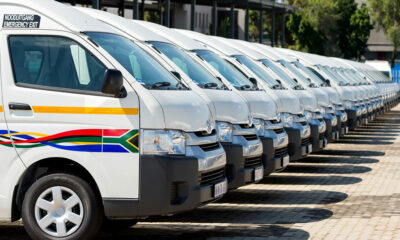Published
9 months agoon
By
zaghrah
South Africans are saying goodbye to cash—and fast. Over the past few years, the country has seen a marked decline in cash use, with more people opting for digital payment methods, even for small, everyday transactions. This trend is reshaping the banking landscape, retail experiences, and even the informal taxi industry.
Prominent banks such as Absa, FNB, Nedbank, and Standard Bank have been cutting back their ATM networks, a direct response to the falling demand for cash. Interestingly, Capitec is the only major bank expanding its ATM footprint—though it also encourages customers to go digital. “We recognise that millions still rely on cash,” said Capitec, “but we aim to offer it more affordably and accessibly for as long as it’s needed.”
Why South Africans Are Ditching Cash
Several factors are driving the decline in cash use in South Africa:
Low-cost digital bank accounts from providers like TymeBank and Capitec have made cashless banking more accessible.
Affordable payment devices from fintech startups like Yoco and iKhokha empower small businesses to accept card and mobile payments.
Scan-to-pay apps like SnapScan and Zapper allow merchants to accept payments without the need for card machines.
A recent SpendTrend 25 report by Discovery Bank and Visa confirmed the trend: digital transactions now dominate, offering South Africans greater convenience, better security, and reward incentives over cash.
The Hidden Costs of Cash
Once seen as cost-free, cash transactions now come with hidden logistical and safety costs. Retailers and small businesses are starting to realise that managing physical money—securing it, transporting it, and counting it—can be more expensive and riskier than digital alternatives.
Discovery Bank CEO Hylton Kallner noted, “Cash is becoming less common as a payment method, with most South Africans now favouring digital transactions—even for the smallest purchases.”
Taxis Go Digital
Perhaps the most surprising shift is happening in the minibus taxi industry, long known for being a cash-only space. With support from Waxd Solutions, drivers are adopting digital fare collection systems. Gauteng Premier Panyaza Lesufi even aims for the industry to go fully cashless by 2026.
The benefits are more than just convenience. Digital payments allow drivers to:
Build formal employment relationships with taxi owners.
Access social protections like the Unemployment Insurance Fund (UIF).
Receive proof of income, helping them apply for loans and financial products.
Transition from financial exclusion to full economic participation.
“Only 4% of taxi drivers currently own homes,” said Waxd CEO Anthony Stewart, “but with digital proof of income, we can change that.”
The Reserve Bank’s Push for Modernization
The South African Reserve Bank (SARB) is finalising new rules to allow non-banks—like digital platforms—to process payments without needing a bank intermediary. This is part of a broader effort to modernise the payments sector and reduce reliance on cash.
Yet, SARB Governor Lesetja Kganyago warns that cash still dominates in the informal economy, driven by fees, limited card support, and a lack of trust. Nearly 50% of South African adults reportedly withdraw their entire account balance as soon as it’s available.
Still, even in the informal economy, cash demand has stalled, declining by 0.8% in 2023.
A Future Beyond Cash
South Africa’s transition to a cashless society is well underway, and the pace is picking up. Whether through scan-to-pay apps, affordable card readers, or digital taxi fares, cash is no longer king. With continued innovation, greater financial inclusion, and government backing, the country is poised to unlock a more efficient and secure economy—one tap at a time.
{Source: My Broad Band}
Follow Joburg ETC on Facebook, Twitter , TikTok and Instagram
For more News in Johannesburg, visit joburgetc.com


Beyond the Glitter: Why Analysts Say the Undervalued Rand Still Has Room to Run


FNB CEO says South Africa’s economic outlook is quietly improving


ANC Slams Reckless Scholar Transport Sector After Crash That Claimed 14 Young Lives


Why lower interest rates are back on the table for South Africa in 2026


To Cut or Not to Cut? SA’s Interest Rate Decision Hangs on a Knife-Edge


The Digital Pickpocket: Capitec’s Urgent Warning as Scams Surge in Sophistication















